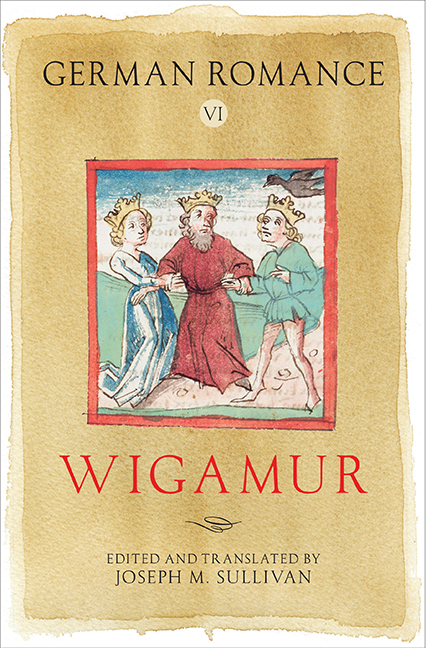Introduction
Published online by Cambridge University Press: 05 June 2016
Summary
Wigamur is an anonymously authored, thirteenth-century romance about a king's son who is lost to his parents in infancy and who eventually reconnects with them and assumes a position of leadership in society. It is one of the approximately fifteen narratives making up the Middle High German corpus of Arthurian romances that begins with Hartmann von Aue's Erec from about 1190 and which runs until the end the thirteenth century. An Arthurian knight named Wigamur seems to have been fairly well known in the German-speaking lands until the end of the Middle Ages, with a Wigamur referred to, for example, in a leich by the poet Tannhäuser (active c.1227–66), surfacing as a walk-on character in another Arthurian romance, Albrecht's Jüngerer Titurel (about 1260–70), appearing in a list of illustrious heroes in the fourteenth-century dynastic epic Friedrich von Schwaben, and mentioned in several late-fifteenth-century sources, including perhaps most importantly the Lannzilet romance of Ulrich Füetrer's Buch der Abenteuer.
Yet despite what appears to have been a positive familiarity on the part of medieval audiences for the fictional knight Wigamur, the romance Wigamur has remained among the least studied of all German Arthurian narratives. Such inattention is in accord with long-seated trends in medieval German literature studies, which traditionally have focused on the Arthurian works of Wolfram von Eschenbach and Hartmann von Aue, and dismissively relegated other Arthurian narratives to secondary status. In the case of Wigamur, the absence until recently of fully accessible modern editions, as well as the very late language of the manuscript transmission, have certainly also contributed to a lack of interest in the text.
DATING, AUTHORSHIP AND INFLUENCES
Wigamur is transmitted in one nearly complete manuscript, MS W (Cod. Guelf. 51.2. Aug. 4°), held by the Herzog August Bibliothek in Wolfenbüttel, and in two fragments, MS S (Cod. Ser. Nov. 44433), which is maintained at the Österreichische Nationalbibliothek in Vienna, and MS M, which is held by the Bayrische Staatsbibliothek in Munich.
The ‘Munich fragment’, MS M, is written by two hands in a Textualis script, in paragraph form on parchment, and in an East Franconian dialect.
- Type
- Chapter
- Information
- German Romance VI: Wigamur , pp. xi - xxiiPublisher: Boydell & BrewerPrint publication year: 2015



